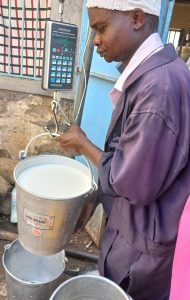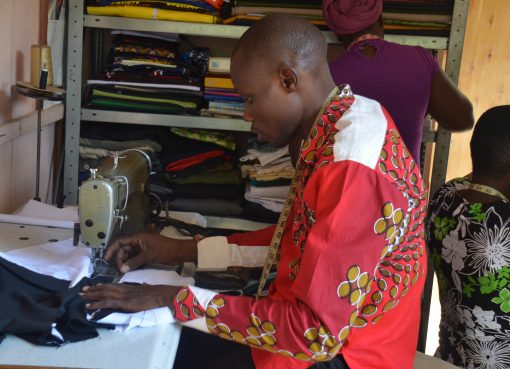Digitization of records, operation systems and improved market prices has contributed to revival of dismally performing dairy farmers’ cooperative societies in the various counties in the country.
Urbanization and the changing demographic has also led to high demand for products such as dairy and this has seen more farmers attracted into dairy farming.
Two months ago, the Kenya Dairy Board data showed that the quantity of milk purchased by processors from farmers went up by 27.7 percent in the first quarter of the year as dairy production increased.
Farmers are now able to meet their financial obligations out of the proceeds they earn from the sale of milk within their localities and their environs.
Prof. Wycliffe Aluoch Aboka, Director of the Institute of Cooperative Development at the Cooperative University of Kenya (CUK), says that they have been implementing a digital platform project dubbed, Kenya Rural Transformation Centers Digital Platform (KRTCDP) that connects farmers with agricultural players.
In order to increase productivity, profitability and sustainability of agricultural cooperatives, Aboka explained that the project is integrating small holder farmers with all stakeholders along the agriculture value chain by developing a digital platform that connects them with private sector and public services.
Prof. Aboka who was speaking during a media tour on the promotion of the platform ahead of early adopters said “We are linking the dairy cooperatives with various players supplying materials and this include financiers who supply inputs, machinery as well as link them to markets.

“Agricultural cooperatives face challenges whereby farmers produce but brokers come in and take advantage of them without knowing and therefore this platform will afford them the advantage of being able to get supply of various inputs and other services including providing them with the best markets at the cooperative level
The Pilot project is currently being implemented in four Counties of Narok, Nakuru, Baringo and Nyandarua on three value chains namely Dairy, Maize and Irish Potatoes.
The director said they have been mapping all the cooperatives in the four counties, dealing with the three-value chains and although they are doing well, there is still so much that needs to be done.
“We are hopeful that this project is going to make a big difference in the operations and success of the cooperatives in the space,” Prof. Aboka said.

The establishment of dairy cooperative societies has helped in farmers adopting current farming models, especially even zero grazing and replacing indigenous breeds with exotic dairy cows like the Friesian, Ayrshire, Jersey and Guernsey that are highly productive in terms of milk production.
Nairagie Enkare dairy farmer’s cooperative in Narok County is one of the examples of small dairy that was started in the 1960s, but collapsed in 1971 due to bad leadership and proper planning, but now has become an aggregation centre contributing to the economic growth.
The society chairman Solomon Munke explained that they again opened their doors in 2014, but also struggled owing to the farmers’ lack of delivering milk due to market and stiff competition.
“We are now fully operational from 2019 and are happy that the aggregation is able to bring together dairy farmers from this region and surrounding area with farmers benefiting from economies of scale in terms of procuring farm inputs.
Other benefits, he added are direct market of the milk to the big companies as farmers are no longer hawking milk like before as the County Government of Narok has donated to them a milk cooler, thus being able to preserve milk for long.
John Kamau Waweru, Manager of the Tulaga Dairy Factory in Njambini, Nyandarua has also been struggling with the milk production and marketing just like the Enkare cooperative.
The Tulanga cooperative that was also started in 1962 with around 429 members has also come a long way and even had to discard some of the value chains they had started to remain with only dairy because of poor markets.
Kamau said they had been collecting raw milk for sale to processors, but due to outcry by farmers on prices being unpredictable, they have since 2017 initiated investments programmes and engaging in milk pasteurization.
The factory has upgraded and is value adding their milk through a yoghurt processing line, which they installed and now sell in large quantities and this has seen better prices for their produce.
Currently, the factory packs fresh milk, Mala and produces the Ranges yoghurt, with Kamau confirming that the business is now able to support farmers in terms of services such as the agro vets, accessing goods on credit, while maintaining a check off system.
“From the initial 429 members and now with a growth of over 3,500 members, the volume of the milk is currently at 23,500 per day, but can go up to 26,000 during the peak season,” he said.
He noted that farmers are now operating with plans, making sound decisions and are organized especially with the weather patterns changing, they are able to get enough forage and plan for their animals.
Kamau said apart from the marketing issues, the biggest challenge they are facing with the value addition is the cost of production and also cost of operation.
Rachel Kiruti, who delivers 30 litres of milk daily to Enkare cooperative said, “Embracing modern dairy farming has strengthened women empowerment and reduced numerous conflicts in our families.
Kiruti added that as a woman she now also is able to manage her bills as she does not depend on her husband’s resources.
“I support home development chores such as increasing the dairy cows and paying school fees for our children and even starting small businesses of groceries and poultry,” she said.
Spearheaded by the Cooperative University of Kenya and supported by the African Development Bank (AfDB) the Kenya rural Transformation Centres Digital Platform (KRTCDP) project will see informed decision making by farmers in access to financing options and broader market opportunities.
By Wangari Ndirangu





